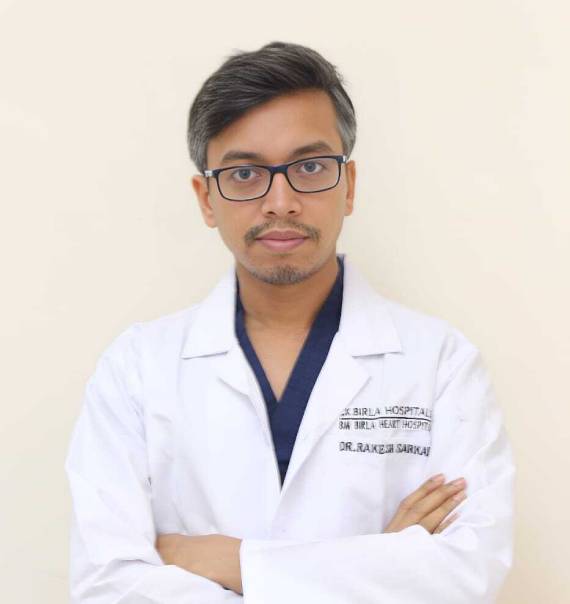



Dr Rakesh Sarkar is an experienced cardiologist and electrophysiologist associated with BM Birla Heart Research Centre. His expertise lies in doing complex arrhythmia procedures and novel pacing techniques as management of heart failure and arrhythmia. He is a specialist in Atrial Fibrillation, Atrial Flutter, Ventricular Tachycardia, CRT-D, and conduction system pacing in novel pacing techniques.

Clinical cardiology focuses on diagnosing and treating heart diseases and conditions in patients.

Interventional cardiology is a specialized field within cardiology that focuses on using catheter-based techniques to diagnose and treat cardiovascular conditions.

An electrophysiology study (EP study) is a test used to evaluate your heart's electrical system and to check for abnormal heart rhythms.

Cardiac implantable electronic devices (CIEDs) are established treatments for a variety of cardiac arrhythmias.

3 years(2010-2013) – Bankura Sammilani Medical College

Department for 1 year (2013-2014)- Calcutta National Medical College


department for 3 years (2014-2017)- R.G.Kar Medical College.Kolkata


for 1 year (2017-2018)- Calcutta National Medical College


1 year (2018-2019)- CARE Hospital, Hyderabad(under guidance of Dr. C. Narasimhan)


Medanta the Medicity: January 2021-Jan ,2022


1stJanuary 2022 to 15th June 2022,Medanta the Medicity


15th June 2022 to 31st October,2022 ,Narayana Superspeciality Hospital,Howrah


From 3rd November 2022 to till the date at B M Birla Heart research centre,kolkata.

Radiofrequency Ablation (RFA) is a procedure used to destroy abnormal heart tissue that is causing arrhythmias. It is often performed following an EP Study, which maps the abnormal electrical pathways in the heart. RFA uses high-frequency electrical currents to create heat, targeting and eliminating the specific areas responsible for irregular rhythms.
3D Mapping provides a detailed, three-dimensional view of the heart's electrical activity. By creating a precise map of the heart's electrical signals and abnormal pathways, 3D Mapping allows for accurate identification of arrhythmia sources. This improves the precision of ablation procedures and increases the likelihood of successful outcomes.
Cryoablation is a technique that uses extreme cold to freeze and destroy abnormal heart tissue causing arrhythmias. Unlike Radiofrequency Ablation, which uses heat to ablate tissue, Cryoablation involves applying a cryoprobe to the targeted area to freeze it. This method can be particularly useful for specific types of arrhythmias and may offer different risks and benefits compared to RFA.
While EP Studies and ablation procedures are generally safe, they do carry some risks, including bleeding, infection, or damage to heart tissues. Specific risks depend on the procedure performed (e.g., RFA or Cryoablation) and individual patient factors. It's important to discuss these risks with your cardiologist to understand how they may apply to your situation.
The recovery period varies depending on the procedure and individual patient factors. Generally, patients may experience mild discomfort or bruising at the catheter insertion site but can resume most activities within a few days. Your cardiologist will provide specific post-procedure care instructions and a timeline for resuming normal activities based on your case.
Dr. Rakesh Sarkar is a specialized cardiologist with extensive experience in EP Studies, having handled over 5,000 cardiac cases. His expertise ensures high proficiency in diagnosing and treating various arrhythmias through this procedure.